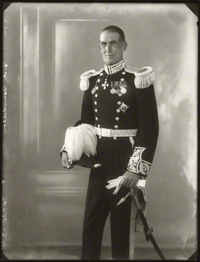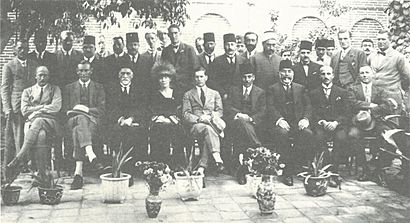Bernard Henry Bourdillon facts for kids
Quick facts for kids
Sir Bernard Henry Bourdillon
|
|
|---|---|

Sir Bernard Henry Bourdillon by Bassano. 3 October 1932.
|
|
| Governor of Nigeria | |
| In office 1 November 1935 – 1943 |
|
| Preceded by | Sir Donald Charles Cameron |
| Succeeded by | Sir Arthur Richards |
| Governor of Uganda | |
| In office 1932–1935 |
|
| Preceded by | Sir William Frederick Gowers |
| Succeeded by | Sir Philip Euen Mitchell |
| Acting Governor of British Ceylon | |
| In office 11 February 1931 – 11 April 1931 |
|
| Monarch | George V |
| Preceded by | Herbert Stanley |
| Succeeded by | Graeme Thomson |
| Personal details | |
| Born | 3 December 1883 Burnie, Tasmania |
| Died | February 6, 1948 (aged 64) St Saviour, Jersey |
| Citizenship | British |
Sir Bernard Henry Bourdillon (1883–1948) was an important British leader. He served as a governor in different parts of the British Empire. He was the Governor of Uganda from 1932 to 1935. Later, he became the Governor of Nigeria from 1935 to 1943.
Contents
Who Was Sir Bernard Bourdillon?
Bernard Bourdillon was born on December 3, 1883, in Burnie, Tasmania. His parents were English. Even though he was born in Tasmania, he always felt he was English. He grew up in England and South Africa.
He went to Tonbridge School and then to St John's College, Oxford. He finished his studies in 1906. In 1908, he joined the Indian Civil Service, which was a way for British people to work in the government of India.
In November 1909, he married Violet Grace Billinghurst. People described Violet as "the perfect Governor's wife." His three sons also worked in the Colonial Service, following their father's path. Sadly, his son Bernard, who was working in Palestine, passed away in 1946.
Early Career in India
In 1913, Bourdillon became an Under-Secretary in the United Provinces of India. He was known for being good at languages. In 1915, he became the Registrar of the High Court of Allahabad.
During World War I, Bourdillon joined the army in 1917. He was sent to Iraq in 1918. He became a Major and was recognized for his bravery during a conflict in Iraq in 1919.
After leaving the army in 1919, he joined the civil government in Iraq. He became Political Secretary to the High Commissioner of Iraq in 1921. From 1924 to 1929, he was a Counsellor. He also played a key role in talks about the 1926 Anglo-Iraq treaty.
Leading in Different Colonies
In 1929, Bourdillon moved to the Colonial Civil Service. He became the Colonial Secretary of Ceylon (now Sri Lanka). He served there until 1932. During this time, he twice acted as the Governor of Ceylon.
While in Ceylon, he was the president of the Ceylon Branch of the Royal Asiatic Society. He also visited the Maldives in 1931. He gave advice to the Sultan on how to write the country's first written constitution.
Governor of Uganda
In 1932, Sir Bernard was appointed Governor and Commander-in-Chief of Uganda. He was seen as a lucky governor because he made popular decisions.
- Fairness in Business: Once, there was a problem between Arab merchants and African shopkeepers in Kampala. Bourdillon looked at the facts. He found that the Arab merchants had used unfair business practices. He decided in favor of the African shopkeepers.
- Protecting Wildlife: Another time, leaders from the Tooro Kingdom complained about Belgian poachers. These poachers were illegally hunting animals on their land. Bourdillon investigated and sent patrols to catch the poachers. The poachers were arrested and jailed, even though they were European.
- Justice for Employees: A Belgian resident was accused of mistreating his African employees. Bourdillon listened to witnesses. He made the Belgian man pay a fine. The man was then sent away from Uganda. In these cases, Bourdillon supported the local Africans against Europeans. This was very unusual in colonial Africa.
- Removing Toll Roads: Some people from the Lango group complained about toll roads. These roads made them pay money to travel. A group of Lango people wrote a petition asking for the tolls to be removed. Bourdillon reviewed their request. He ordered the tolls to be removed right away. This meeting only took two hours.
Governor of Nigeria
In 1935, Sir Bernard became the Governor and Commander-in-Chief of Nigeria. He held this important job until he retired in 1943. He was known for wanting to improve colonial policies. He quickly earned the respect of educated Nigerians.
In 1938, he met with the Nigerian Youth Movement. They complained about an agreement that limited competition in the cocoa trade. Bourdillon supported the African position. Soon after, the agreement was stopped. Nigerian newspapers praised him. He stayed close with Nigerian leaders during his time as governor.
Bourdillon was considered "far ahead of his time" on issues of race. He believed that no race was better than another. He worked to increase African involvement in government in both Uganda and Nigeria.
Britain was careful about spending too much money on colonies. They would only lend money if the colonial government promised to pay it back. This made it hard for poorer colonies to get help for development. In 1939, Bourdillon asked the British government to pay for important departments like agriculture and forestry. He suggested a ten-year plan to help develop the colonies.
In 1939, Bourdillon divided the south of Nigeria into Eastern and Western provinces. In the past, the British had governed northern Nigeria indirectly. They worked through local rulers and kept the region somewhat separate. Bourdillon felt this was not the best way. In 1942, he told the northern rulers that they should have an equal say in advising the Governor for the whole country. The rulers agreed.
Bourdillon knew that northerners had less education and English language skills than southerners. He thought about creating Regional Councils with a Central Council in Lagos. These councils would advise the Governor. He believed this system would work best for people who were still developing their education.
He also considered dividing Nigeria into more than three regions. However, no more changes were made before he retired. Sir Arthur Richards took over as Governor.
Sir Bernard Bourdillon also helped as an adviser for the film Sanders of the River.
Later Life and Legacy
After retiring, Bourdillon continued to serve on the Colonial Economic and Development Council. He also became chairman of the British Empire Leprosy Relief Association, a charity helping people with leprosy. He was a director for two Barclays Bank companies.
He passed away on February 6, 1948, in St Saviour, Jersey, at the age of 64.
Bourdillon Road in Ikoyi, Lagos, a well-known street, is named after him.
Awards and Honors
Bourdillon received several important awards for his service:
- He was appointed a CMG in 1924.
- He was promoted to KCMG in 1934 and to GCMG in 1937.
- He was appointed KBE in 1931.
- He was made a Knight of Grace of the Order of St John of Jerusalem.
- He became an honorary fellow of St John's College, Oxford.
Images for kids



